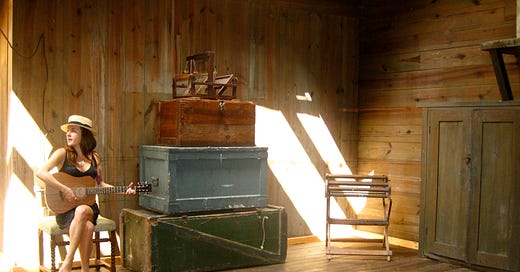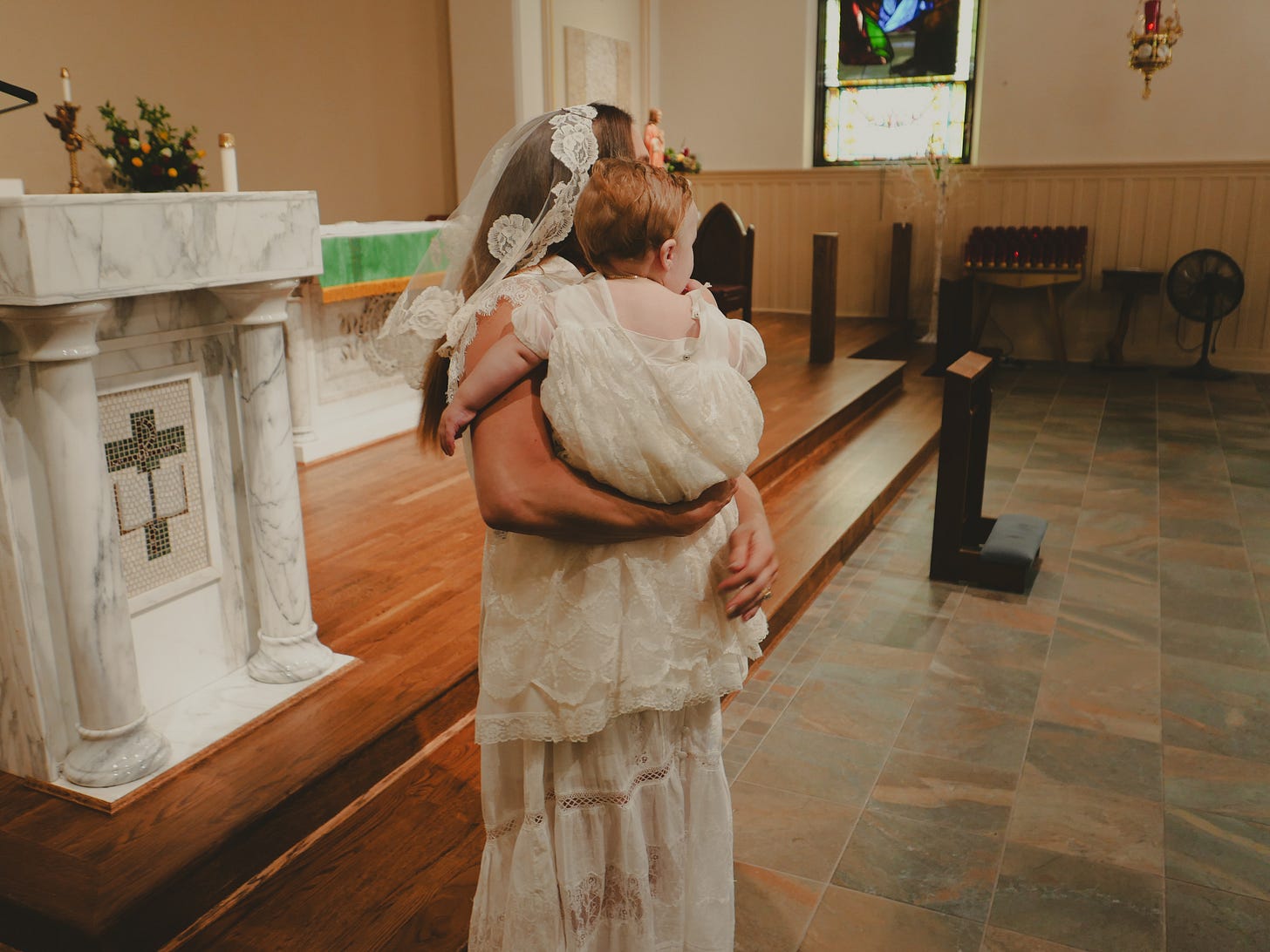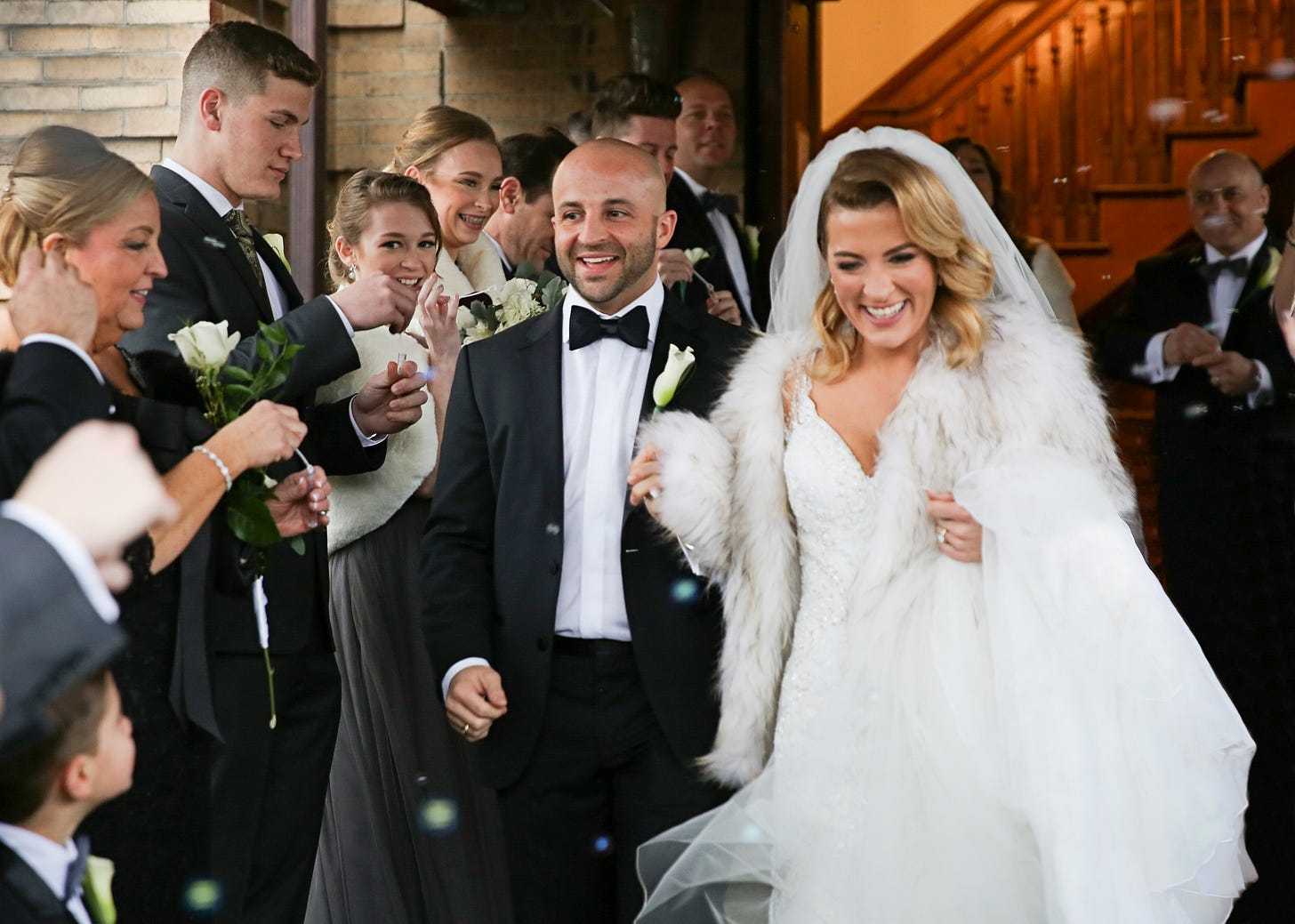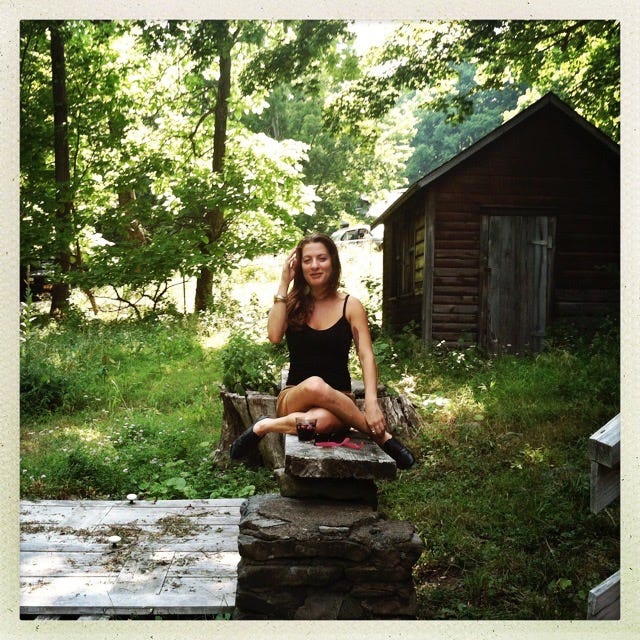God collapses time, & other ways I became a wife & mother
The Tradition of Living Beautifully, Issue #73
Paid subscribers can hear me read this essay by clicking the player at the bottom of the page!
Chella ca nun succede ‘nte ‘n’anne succede ‘nte ‘n’ora. This is my favorite Neapolitan proverb, one that my mother has often said to me. I first heard this during a time in my life when, after my father died and before I met my husband, in a whirlwind of upheaval, I bemoaned that the life I wanted might never actualize. I can remember this time of year, when I was in my early thirties, being awfully difficult for me. February swung back around like a scythe—my birthday followed only a handful of days later by Valentine’s Day—reminding me that I was not only once again alone for this holiday of love, I was also a year older. I became very gloomy. The gloom would last for about two weeks, leading up to my birthday and hanging on for a few days after Valentine’s had passed. During this pocket of years, the shore upon which I now live seemed awfully far off. I worried I’d quite literally never get here. That’s how it is with strong emotions, they seem eternal and everlasting in the moment. Most of us experience something similar: A dream we worry won’t come to pass. A hole in our vision for ourselves, a true heart ache that makes us anxious the thing we most desire will pass us by, forcing us to live with the void. My mother would try to soothe me—Chella ca nun succede ‘nte ‘n’anne succede ‘nte ‘n’ora, she’d say, in a stern, sing-songy voice. What doesn’t happen in a year can happen in an hour.
I made three Valentine’s Day cards this year, one for my husband and one for each of my sons, and while doing so, paused to reflect on how far I’ve come. How, miraculously, that dark time that laid so heavily upon me is now simply memory.
My mother was right, as mothers often are. We wake up one day to find our heart’s desire manifested. All those nights of weeping wash away. The worry vaporizes and is rushed off by some force we can’t see. Love arrives. The pregnancy test turns positive. The deed to the dream house has our name on it. We step onto that yonder shore, and plant our flags. I’ve also heard this described, I can’t now remember where, as God having the power to collapse time. The years stretch on with no hint that what we want is coming, and then, in a blink, it’s here. We weren’t a mother for years, yet yearned to be, and then, suddenly, we hold babies in our arms.
The waiting itself isn’t so much the problem. If we can hold the confidence that what we want will certainly come, we’d be calmer about it. It’s the not knowing, of course, that’s unsettling; the way that time unfolds with evidence behind us, and nothing but mystery before us. I remember during these “dark-time” Februaries speaking to a wise older friend and telling him, at the peak of my panic, that I was thinking of having my eggs frozen. He answered, matter of factly, “Just find a fucking boyfriend.” It was a very simple, very direct, very masculine reply. It took the air out of all my hummingbird energy. It took the wind out of my overthinking, which is often a veiled form of fearing, and snapped at me to do something about it. This was around 33 years old, which seems wild, because from where I’m standing now, thirty-three seems a young and whole-life-ahead-of-you age.
I was recently a guest on The Homemaker Chic Podcast, where I spoke with hosts
and about curating a beautiful family life. We talked about how I don’t share how old I am publicly, and I felt a little squeamish trying to explain my old-school propensity to keep my age private, because I seem to be the only woman left on the planet who still practices this custom. If I’m honest, and on this topic I really don’t want to be, but here goes, I think somewhere in that reluctance is a kind of embarrassment at having had kids later in life; instead of being proud that I was able to conceive two children naturally in my forties (there, I said it, I’m in my forties!), I seem to shoulder this messaging directed at older women that I’m stepping on the natural order of things. This isn’t just imagined. When I was pregnant with my second son, the first practice I went to made it a point at every visit to remind me of my age and the litany of possible complications that could arise because of it; I left every visit shaken up, sitting in the car googling the odds of whatever malady the doctor had just mentioned. The second doctor I went to, because I’d had enough of being treated that way, never made age an issue. In fact, he assured me that it was my health that mattered most, and that I was in better shape than many of his 20-something patients. You shouldn’t be aged out of the game because you played a few bad hands in your younger years.You missed the boat, lady, the voice says, how dare you try to get in it now.
Which is interesting, or perhaps frustrating, because when I was younger the messaging was that I was too young, which is part of what got me here in the first place….
There are a few reasons women are having babies when they’re older. One reason is, yes, because they place careers ahead of family, and while I’m not a big advocate of that, while I would encourage a little sister of mine to have her children in her 20’s and worry about a career later, to each his own. But a big reason is this: In the weird and isolating world we live in, many of us simply didn’t find partners with which to have children until later in life. And there are a host of reasons for this as well.
My generation of women in particular were told children would hold us back. That it was our right and our “choice” to put ourselves and our careers first. All of my high school friends save for one had children in their mid-to-late thirties, if not later. While everyone’s grateful to have been given the blessing of children, now that we’re experiencing the joy and challenge of being mothers and wives, we’re not quite sure why we waited so long to put the pieces into place. The messaging we received when we were younger, not from our families, but from culture (and I think this is also a particularly coastal cultural thing, a very New York, East Coast notion) was that we had all the time in the world to make that droll and bourgeois stuff happen, if we even deigned to want to make it happen at all. First, we had ourselves to think about. It was a lot of girl power and Alanis Morissette singing about liberating sexually in a movie theater and Ani DiFranco screeching about not needing a man. Gloria Steinem, although not of our generation but still residually influencing it, famously said that a woman needs a man like a fish needs a bicycle, and we thought that was funny, instead of unnerving. We soaked it up, rather righteously, not knowing it would have real consequences on our lives.
When you’re young, time seems irrelevant. There’s always more of it. You think, if you think of it at all, that just as you open the door and the landscape waits there, you merely have to turn a little knob, and more time, more opportunity, more possibility will be immutably waiting for you. You don’t realize that the landscape does, indeed, change, subtly at first and then astoundingly. In my twenties, I played with life, as if none of my decisions would matter. I juggled the years as if what I caught and what I dropped would not actually stick. There was always more time, another chance, another exit or entrance. Until, of course, there wasn’t.
During this time of year, while I would’ve struggled with a very real and heavy sadness, when I look back on that younger version of myself, I’m grateful to her as well. She did a lot of things that make me cringe, but she did a few things that were smart. She did some things that made it possible to find a partner and for her body to conceive children later on down the road. This is an important piece to the art of waiting—do what you can now to ensure a better outcome then, when what you want does arrive. She had stopped smoking and exercised regularly and earnestly. She used herbs and organic food to nourish her body. She stayed away from birth control, not buckling to the pressure of doctors who told her artificially impacting her hormones monthly for years was just fine and nothing of concern. She had an awakening and learned how to meditate and be mindful and intentional. She added alternative healing modalities like acupuncture into her weeks and spent a lot of time in saunas, sweating out toxins. She changed some of her beliefs, with difficulty at first, such as the one that said something was wrong with her, that she lacked some intrinsic goodness others innately possessed. And while it’s tempting to want to tell her things now, like Don’t worry, you’ll find love, you don’t need to be anxious, you’ll have the family you dream of, I’m not going to do that to her, because she didn’t know any of that. She was in the dark. Nothing but questions lay before her.
I had many women reach out to me after the recent Homemaker Chic episode aired, women wanting to start families, wanting to arrive upon their respective shores, and asking me to point them in the direction of good resources. (The first place I direct any woman, regardless of her age, but especially if she’s older, when she wants to improve her fertility, is to my friend Aimee Raupp, whom I adore and who is a gift to women’s health.) Receiving those messages got me thinking about writing this essay. It’s a hope game, of course, making dreams come true, whatever your age and whatever the dream. In those Februaries I would’ve been mighty comforted hearing from a woman who managed to create a family even as the clock ticked and the landscape shapeshifted before her, and also because I no longer want to be burdened by the voice of those first doctors, here I am, stepping out a bit from behind my self-imposed curtain, to say that if you’re looking for hope and inspiration, consider this your telegram full of both.
What doesn’t happen in a year can happen in an hour.
Thanks for being here with me, truly.









